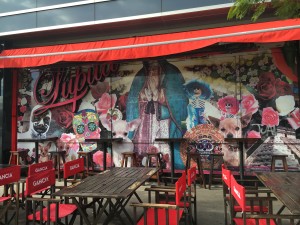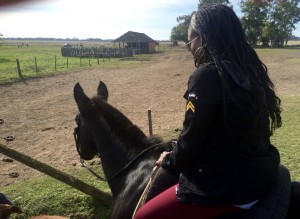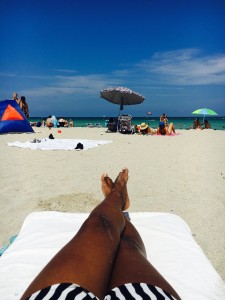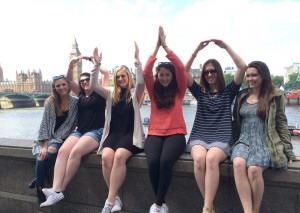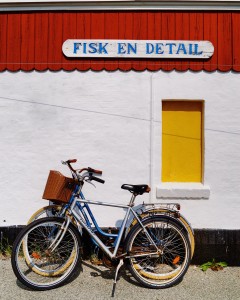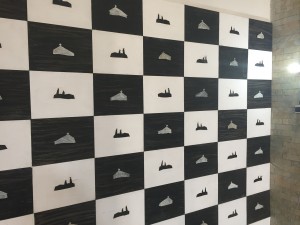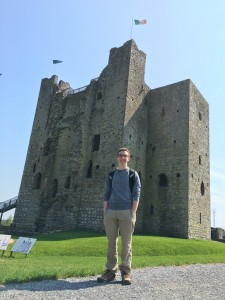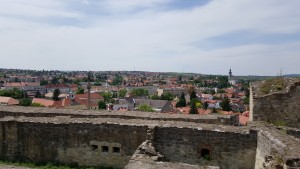
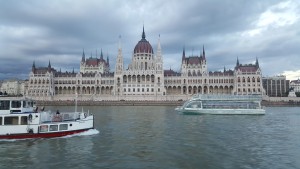
Name: Jeffrey Hooper II
Type of Project: Study Abroad
- Please provide a brief description of your STEP Signature Project (2-3 sentences)
Immediately following spring semester, I finally travelled outside the United States by embarking on a month-long, STEP-funded adventure across Central Europe with 24 other OSU students. Our diverse group was navigated across the capital cities of Austria, Hungary, and Poland by the fearless OSU professor Daniel Pratt, our resident director and cultural compass. This magical month included weekday classroom sessions that culminated in a group video project, interspersed with weekend travel excursions, charming conversations, fabulous food, and daily cultural confusions.
- What about your understanding of yourself, your assumptions, or your view of the world changed/transformed while completing your STEP Signature Project? (1-2 paragraphs)
Spending a month in Europe decisively challenged my mentality toward college life and education while stimulating unexpected curiosity and engagement with my cultural roots back in Ohio. Upon returning to campus in August, I will aspire toward a more academically, professionally, and socially balanced lifestyle. Throughout my lifelong educational journey, I had naively and uncritically equated academic achievement with personal development. During those formative years, especially high school, I wasn’t committed to cultivating the relationships and passions that define a well-rounded individual. Perhaps that reluctance to explore and open up to others was linked to my introverted personality, financial uncertainties, academic indecisiveness, or other factors. Anyway, academic dedication allowed me to attend OSU and live in Columbus, an opportunity to reinvent myself. Before leaving for Europe in May, two years at OSU had already breezed by and I was struggling more than ever to articulate a career vision and find social fulfillment. However, I did have many meaningful experiences, including several Buck-I-SERV trips and collaboration with international students through OSU’s Global Leadership Initiative (GLI) cohort. Studying abroad was the natural next challenge to intensively travel and build community with other OSU students, yet this time outside my native country and cultural comfort zone. After considering endless possibilities, I settled on the Global May Hungary trip for a multitude of reasons. Most importantly, this program was enthusiastically recommended by several previous participants and I also loved the interdisciplinary class structure with the open-ended final project. The shockingly low cost and opportunity to visit multiple countries made the decision that much easier. Besides the potential for relationship building, academic enrichment, and global engagement, I most fundamentally desired to learn lessons of personal growth and self-awareness to guide my future career decisions and contributions to the world.
So, after all those lofty expectations, how did study abroad actually transform my personal aspiration and day-to-day life? Most importantly, I adapted to an intense social environment and felt liberated being myself. Especially during grade school and continuing through college, I rarely had friends over or went to parties; I mainly interacted with classmates academically or athletically. Living intensively in Europe for a month in a hostel with free-spirited college students who like to drink and eat out together, I had to leave my social comfort zone frequently and be tolerant of different lifestyle preferences. I ended up developing several strong friendships with people who I see as trustworthy confidantes to really help guide me on my journey. Besides practicing open-mindedness, I developed a passion for the region of Central and Eastern Europe that I have already acted upon academically. Going beyond Western stereotypes of these nations being reactionary, corrupt, and oppressed, I really empathized with these countries who have grappled with countless invasions and complex identities during their traumatic histories. I often felt overwhelmed by how much I didn’t know about other cultures and historical events. Perhaps the greatest gift of travelling and embracing diversity is sustaining the curiosity to learn and constantly reinventing yourself. For future international adventures, I feel like an expert in travel logistics for navigating airports, train stations, and public transportation by myself. At least in Europe, I am less fearful of language barriers because I got by the entire month mainly using English. After my flight home from London to NYC was delayed several hours, I even had to check into my Manhattan hostel at 3 in the morning, terrifying my parents back home. I now have memories and stories to tell that will last a lifetime and inspire me with purpose every day.
- What events, interactions, relationships, or activities during your STEP Signature Project led to the change/transformation that you discussed above and how did these affect you? (3-4 paragraphs)
After visiting and analyzing countless historical sites, museums, and public spaces throughout the trip, I am trained mentally to ask questions and think deeply during future travels about how and what people are served by their cultural institutions and public infrastructures. I really enjoyed how the academic component of the trip was organized with morning class sessions and field trips in the afternoon. The intent of the interdisciplinary curriculum was for us to explore deeply certain topics that piqued our interest, almost as if we were sampling a menu of Central European culture and history. Exploring the Jewish communities of Budapest and Warsaw resonated most because of their tragic stories from World War II and stigmatization in other times. To immerse ourselves in Jewish culture, we toured synagogues, old ghettos, and Jewish monuments, including the emotional Shoes on the Danube memorial in Budapest. In a region frequently exchanged by different empires and fragmented by nationality, issues of identity and migration are understandably sensitive. When I return home to family this Christmas, I’ll probably start researching and asking questions about my own European heritage. Probably my favorite group activity was our scavenger hunt around Warsaw, which forced us to navigate public transportation and find historic sites as quickly as possible.. Based on our particular research interests we formed groups for our final video project. As a warmup to practice our video editing skills, we each made a short video analyzing a particular Budapest monument. Intrigued by latent Russian sympathies in Hungary, I discussed Budapest’s only remaining Soviet memorial, which curiously still occupies a prominent downtown location facing the Hungarian Parliament Building. Budapest, Vienna, and Warsaw each had outstanding public transportation systems, far more convenient and prioritized than in US cities, so I decided to study European public transportation for the video. I started considering uncomfortable questions about why wealthy cities like Columbus fail to make similar investments. Perhaps the urban elites downtown and peripheral suburban communities who wield the most political power enjoy the comfort of a segregated city and want social problems like poverty and crime out of sight and out of mind?
Prior to arriving in Europe, I had never tried an alcoholic beverage before. However, during arrival day in Budapest, our group spontaneously congregated in the nearby pub for some casual afternoon drinking, an unsettling atmosphere at first. I avoided the temptation on this occasion, but I eventually enjoyed several wine bar nights and casual drinks during organized group outings, including a winery visit during our final day in Hungary. As my attitude evolved, I learned lessons of tolerance and patience. I felt completely out of my element navigating the social environment of Szimpla, a famous Budapest ruin pub that I finally visited during our last weekend. Even if my personal comfort zone requires more structured activities and smaller groups than that chaotic experience, I began to recognize the potential social and cultural value of such places. The deepest friendships that I developed came from small group exploration. I particularly loved Budapest’s escape rooms and the teamwork involved in solving those beautiful puzzles. Playing charades while boating on the Danube River was another unforgettable experience and opportunity to just kick back with friends. Other moments of free time were spent hiking caves, relaxing in thermal baths, exploring musical islands, and enjoying the early sunrise. Everyone had shifted to YOLO mode by the end of our trip. Even if we did return to Central Europe one day, travelling with that group of people was priceless so those moments were lived as fully as possible.
Many Americans travel exclusively by automobile and might see and hear only English their entire lives. Protected by two oceans and flanked by two quiet neighbors, the US is very parochial compared to its Western allies in Europe. Having grown up with this mindset, travelling in Europe was both challenging and exhilarating trying to navigate through airports, cities, and public transportation. For both transatlantic flights, I travelled independently with all sorts of delays and connecting flights to keep in mind. With these experiences under my belt, future excursions abroad will be preceded by far less nerves and frenzied travel preparations. Within Europe, we travelled by bus, plane, tram, subway, boat, bicycle, and walking. For the train journey from Budapest to Vienna, our group was even relegated to the cattle car. On a free Sunday, a small group of us took another train to the small Hungarian town of Eger to explore its famous castle and historic town square below. Unlike cosmopolitan, secular Budapest, Eger had hardly any English speakers and felt more like traditional Hungary. To prepare for each country, we learned survival lessons in German, Hungarian, and Polish but mainly people used English anyway. I often felt ashamed that service workers in these countries had to learn English and cater to the preferences of tourists rather than express their own language and culture. I exchanged currency for the first time once I landed in Budapest. By the time our trip was complete, I went home with five different currencies. Living out of suitcase for a month in a primitive hostel room was also an adjustment but forced me to be less materialistic and explore city nightlife. Prior to leaving in May, I have anxiously to all sorts of European travel suggestions about what to wear, buy, and how to behave abroad. Paranoid about being pick-pocketed, I invested in a money belt but eventually ditched that idea after several incident-free days in Europe. Next time visiting the continent, I will definitely leave behind my athletic clothes-dominated wardrobe and try to blend in more with the fashionable crowds. With my track pants and Adidas jackets, I unfortunately looked more like an East European gangster than a cultured traveler.
- Why is this change/transformation significant or valuable for your life? (1-2 paragraphs)
However I spent this summer and regardless of whether that included study abroad, I knew that my looming junior year at OSU would represent a crucial crossroads in my academic and personal journey. My reliance on grades alone for academic and career advancement had reached its limit. I would need to pursue my intellectual curiosities more with students and professors outside the classroom and finally commit to extracurricular challenges. Although I had increasingly stretched my comfort zone in my first two years with leadership roles and service experiences, my academic journey often felt aimless without commitment to any cause or meaningful application of my knowledge. After my European adventure ended in June, I began strategizing on the best route for returning to that fascinating region and how to link that cultural passion with my academic and career goals. Having switched colleges from engineering, I needed a foreign language now anyhow, so I began learning Russian this semester. I also enrolled in two other European-themed courses about organized crime and Southern European politics. I now hope to minor in Russian and hopefully add a major in International Studies with a regional focus on Eastern Europe. With this academic plan, I am increasingly committed to and see myself thriving in an internationally focused career likely in public service or academia. To realize those lofty, idealistic ambitions, I will need to continue networking with similarly passionate students and professors. Even if I can’t find the perfect fit, I will have to start making tough decisions about internships and graduate school soon; the real world is start to dawn on me. Besides career planning, perhaps my greatest challenge going forward is developing and practicing critical thinking skills. Too often when I’m taking a class or passively following the news, I focus on memorizing and consuming information rather than stepping back to think deeply about solutions. To truly transform into the globally-minded leader of my imagination, I will need exceptional self-awareness and communication skills to translate my passions and talents into meaningful action on the world stage. After fifteen years of taking tests and reading textbooks, academic success seems far less satisfying than ever before. Having now travelled through communities across the US and Europe, I feel compelled to finally create something meaningful of my own. That journey into the unknown begins now.







